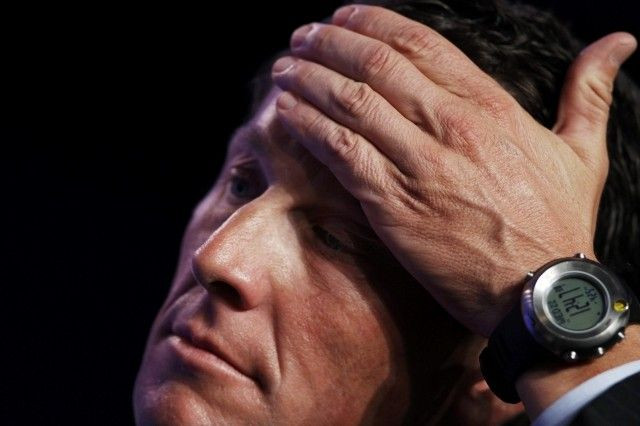A Second Chance For Lance Armstrong
Opinion

The rumor is that Lance Armstrong will sit down with Oprah Winfrey next week to make a public admission about using performance-enhancing drugs over the course of his once heralded, but now tainted, cycling career. It is a sad, but somewhat unsurprising, twist in the saga.
Armstrong’s accomplishments as an athlete are unprecedented. Not only did he win a record seven Tour de France titles -- an event considered by many to be the most grueling in sports -- but he did so after battling and overcoming testicular cancer. Most admirably, he used his comeback, his triumphs, and his celebrity to create a charitable platform from which to champion cancer research and he popularized the cause with the universally recognized yellow “Livestrong” wristbands.
But as the rampancy of drug use across sports has been increasingly exposed, Armstrong has continued to face accusations that he was one of the biggest cheaters of all. For years, he has denied using performance-enhancing drugs, or PEDs, -- an assertion he has yet to change -- citing countless drug tests he passed over the course of his career.
He proclaimed his innocence with a stridency and self-assurance that left people hoping, and possibly believing, he was telling the truth. But after the U.S. Anti-Doping Agency conducted an investigation and concluded that he participated in a massive doping ring, stripping him of all his titles, even his most ardent supporters and sponsors began abandoning him.
Personally, I have long believed that Armstrong was lying and cheating, because I know what it is like -- and what it looks like -- to live a lie. I was once a successful businessman with a compulsive gambling addiction. When I wasn’t eating, sleeping, or working, I was figuring out how to make my next trip to the Vegas tables, living a double-life to service my addiction. Like many lies, mine was exposed, and I paid a steep price, eventually going to prison. While Armstrong will probably avoid the same legal repercussions, his confession, nonetheless, will be costly as well.
That’s because the price is heaviest with your loved ones and yourself. The best liars don't just perpetuate their falsehoods to the world; they literally convince those closest to them -- including themselves -- that their fallacies and delusions are real.
We often don’t accept what we have done, and who we have been, until we appreciate what we have lost and what remains to be salvaged. For Armstrong, much remains, including a family and children who he can make proud by owning up and being genuine.
While the fall from grace for Armstrong will obviously be steeper than for most, acknowledging his shortcomings will once again make him like a lot of other people in this world, not necessarily bad, just human.
Certainly, this is not to excuse his behavior -- or mine. And hopefully if Armstrong comes clean he will not try to excuse it either. There is no justification, not ego, fame, money, or a platform from which to do charitable work that will make Armstrong’s reasoning acceptable.
A confession would expose that he was somebody different than who he purported to be, and like me, he will face that fact every day for the rest of his life. But he was not the first, nor will he be the last, and the only way to seek redemption now and to make believers again out of the naysayers and skeptics is to scream the truth -- over and over until it resonates with loved ones, the world, and, most important, himself.
What always made Armstrong so popular and likable was his humanity. It was that he had lied in a hospital bed facing death -- that same death we all fear -- and came back to triumph. He then used his celebrity to fight a disease that could afflict any one of us, no matter how rich, famous, or strong.
As he now surely stares into the mirror and the abyss of public sentiment, he is once again left to reclaim that one thing that made him admired in the first place. Like so many humans, he is flawed, imperfect, and, unfortunately, corruptible. Now he gets to be real.
In last year’s movie “Flight,” Denzel Washington played an alcoholic airplane captain who ultimately goes to jail for piloting a flight that crashed while he was intoxicated. At the end of the movie, he tells the inmates how if he had told just one more lie he would be “free.” But he couldn’t. And choosing to come clean, while putting him behind bars, left him freer than ever.
Lance, make the choice. Make it yours, and start pursuing your second chance.
Adam Resnick is the author of the book “Bust: How I Gambled and Lost a Fortune, Brought Down a Bank -- And Lived to Pay for It.” Follow him on Twitter @adambresnick.
© Copyright IBTimes 2025. All rights reserved.





















